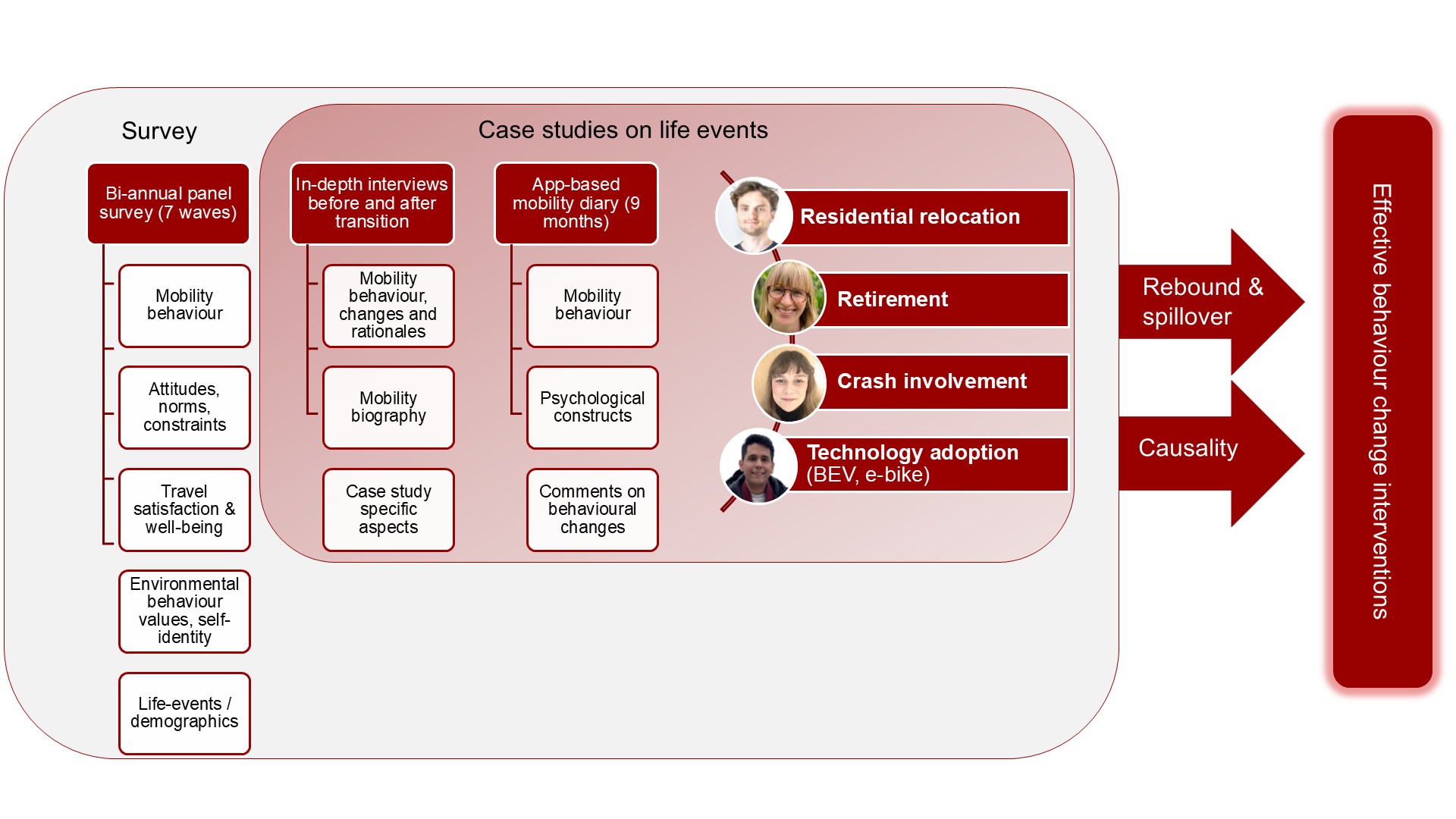Choice, necessity or chance?

UNDERSTANDING BEHAVIOUR CHANGE IN TRANSPORT
The URGENT project aims to provide the knowledge base for more effective intervention strategies for behavioural change in transport. To this end, the project examines the individual and contextual circumstances under which people change their mobility behaviours and the mental mechanisms involved in this process. URGENT uses a holistic, interdisciplinary approach based on a unique longitudinal dataset. Over a three-year period, we are collecting data via a large biannual survey as well as four case studies involving interviews and mobility diary apps with selected participants. With this threefold approach, we examine how people adapt their mobility behaviours in anticipation of and in response to:
· residential relocation;
· retirement (as a long-time anticipated life-event);
· crash involvement (as a very sudden event);
· electric vehicle adoption.
A special focus lies on the different effects of sudden versus anticipated/planned and desired versus undesired life events. We thus pursue the question of whether and to what extent travel behaviour change is subject to choice, necessity, or chance.
Applying causal machine learning methods, the project will uncover which personal, social, technical, or spatial factors are most relevant initiators of behavioural change and will specify the causal relations between the involved factors, informed by the case studies. URGENT will additionally examine rebound effects of changed mobility behaviour (e.g. car use reduction, electric vehicle adoption) and reveal under which conditions, and to what extent, behaviour change in one area (e.g. commuting) positively or negatively spills over to other areas (e.g. air travel, food consumption). URGENT applies a novel analytical strategy that cross-fertilizes concepts from psychology (behaviour change models), human geography (mobility biographies approach), sociology (mobility cultures) and machine learning (causal discovery and causal inference). The project aims to increase the understanding of behaviour change in transport, but also bears the potential to lead to a breakthrough in studying causality in transport research at large.
Pretium nibh ipsum
· residential relocation;
· retirement (as a long-time anticipated life-event);
· crash involvement (as a very sudden event);
· electric vehicle adoption.
A special focus lies on the different effects of sudden versus anticipated/planned and desired versus undesired life events. We thus pursue the question of whether and to what extent travel behaviour change is subject to choice, necessity, or chance.
Applying causal machine learning methods, the project will uncover which personal, social, technical, or spatial factors are most relevant initiators of behavioural change and will specify the causal relations between the involved factors, informed by the case studies. URGENT will additionally examine rebound effects of changed mobility behaviour (e.g. car use reduction, electric vehicle adoption) and reveal under which conditions, and to what extent, behaviour change in one area (e.g. commuting) positively or negatively spills over to other areas (e.g. air travel, food consumption). URGENT applies a novel analytical strategy that cross-fertilizes concepts from psychology (behaviour change models), human geography (mobility biographies approach), sociology (mobility cultures) and machine learning (causal discovery and causal inference). The project aims to increase the understanding of behaviour change in transport, but also bears the potential to lead to a breakthrough in studying causality in transport research at large.
Project Design
The project involves three kinds of data collections:
· a panel survey that collects data every 6 months over a 3-years period, starting with a sample of about 12000 individuals living in all parts of Denmark
· a mobility app data collection, automatically collecting mobility data and requesting regular attitudinal information of ca. 100 case study participants and a matching control group
· in-depth interviews with case study participants before and after the anticipated life event (in case of people involved in a crash, only after the crash)
The figure below provides and overview of the study design and the researchers currently responsible for the different case studies. At a later stage of the project, two PostDocs will be involved – one working on the examination and quantification of rebound effects based on the complete dataset, and one working on inferring causality.
· a panel survey that collects data every 6 months over a 3-years period, starting with a sample of about 12000 individuals living in all parts of Denmark
· a mobility app data collection, automatically collecting mobility data and requesting regular attitudinal information of ca. 100 case study participants and a matching control group
· in-depth interviews with case study participants before and after the anticipated life event (in case of people involved in a crash, only after the crash)
The figure below provides and overview of the study design and the researchers currently responsible for the different case studies. At a later stage of the project, two PostDocs will be involved – one working on the examination and quantification of rebound effects based on the complete dataset, and one working on inferring causality.

updates
• Events •
May 2025: Online seminar on preliminary project results (Focus: residential relocation and electric vehicle adoption)
April 2026: Online seminar on preliminary project results (Focus: retirement and crash involvement)
• Publications and activities •
For an overview on our most recent publications and activities, please click the links below.
Newsletter
You can sign up for our URGENT Newsletter by clicking the "Register" button, or directly access them by clicking the "Newsletter" links below.
Team
Funding
The URGENT project has received funding from the European Research Council (ERC) under the European Union’s Horizon 2020 research and innovation programme (Grant agreement No. 101044339).

Contact
For overall questions on the URGENT project, please contact Sonja Haustein (sonh@dtu.dk)
For questions related to the case studies, please reach out to the researcher related to each study:
Sonja Haustein ✉️
Dario Raven Stolze ✉️
Nina Friser Holst ✉️
Alfredo Jose Ojeda Diaz ✉️
Urgent ✉️
For questions related to the case studies, please reach out to the researcher related to each study:
- Residential relocation: Dario Raven Stolze (drast@dtu.dk)
- Retirement: Nina Friser Holst (nfrho@dtu.dk)
- Crash involvement: Emma Heiberg (emmhe@dtu.dk)
- Electric vehicle adoption: Alfredo Jose Ojeda Diaz (aljose@dtu.dk) and Emma-Sofie Hestbech (emhes@dtu.dk)